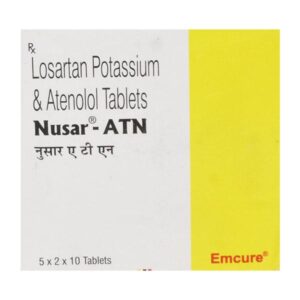ATENOLOL + LOSARTAN
Atenolol: Atenolol is a medication classified as a beta blocker. It is primarily used to treat high blood pressure (hypertension) and chest pain (angina). It can also be prescribed for certain heart rhythm disorders, such as atrial fibrillation or ventricular arrhythmias. Atenolol works by blocking the action of certain chemicals in the body, specifically adrenaline, which helps to reduce heart rate and blood pressure.
The recommended dose of atenolol varies depending on the condition being treated. For hypertension, the typical starting dose is 25-50 mg once daily, which may be increased as needed. For angina, the usual dose is 50-100 mg once daily. The dose may be adjusted by a healthcare professional based on individual response.
Like all medications, atenolol can cause certain side effects. Common side effects may include tiredness, dizziness, lightheadedness, slow heartbeat, cold hands or feet, and nausea. These side effects are usually mild and transient, but if they persist or worsen, it is important to consult a healthcare provider.
Less common but more serious side effects of atenolol may include difficulty breathing, wheezing, swelling of the face, lips, tongue, throat, or extremities, sudden weight gain, and signs of an allergic reaction (e.g., rash, itching, severe dizziness). If any of these serious side effects occur, immediate medical attention should be sought.
Atenolol may not be suitable for everyone, especially individuals with certain medical conditions such as heart block, heart failure, asthma, diabetes, or certain types of blood circulation disorders. It is important to discuss any existing medical conditions and medications with a doctor or pharmacist before starting treatment with atenolol.
In conclusion, Atenolol is a beta blocker used primarily to treat hypertension and angina. It works by reducing heart rate and blood pressure. The dose varies depending on the condition being treated. While it is generally considered safe, like all medications, it can cause side effects. It is important to be aware of potential adverse effects and to consult a healthcare professional if any concerns arise.
Losartan: Losartan is a medication that belongs to a class of drugs called angiotensin II receptor blockers (ARBs). It is mainly used in the treatment of hypertension (high blood pressure) and can also be prescribed for certain types of heart failure.
The mechanism of action of Losartan involves blocking the action of angiotensin II, a hormone that causes blood vessels to narrow, resulting in increased blood pressure. By blocking the effects of angiotensin II, Losartan helps to relax and widen the blood vessels, reducing blood pressure and improving blood flow.
The usual starting dose of Losartan for treating hypertension is 50 mg once daily, which can be increased to a maximum of 100 mg once daily if necessary. In heart failure patients, the starting dose is typically 12.5 mg once daily, which can be increased to a maximum of 150 mg once daily.
As with any medication, Losartan can have side effects. Common side effects may include dizziness, headache, fatigue, and stomach pain. Rare but potentially serious side effects include allergic reactions, swelling of the face or throat, increased potassium levels, and liver problems. It is important to consult a healthcare professional for a complete list of potential side effects and to discuss any concerns or pre-existing medical conditions before starting Losartan.



